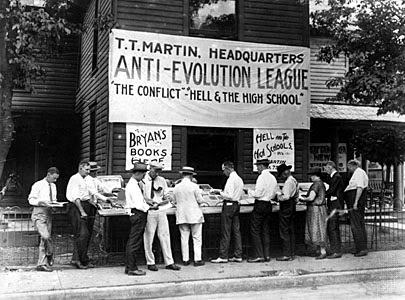The "debate" lives on 89 years later. It is worth looking at the comments to this anniversary note, just to get a cross section of opinion, as the theory of evolution remains a deeply divisive issue in America. More striking is that Americans are less accepting of evolution than any country in Europe except for Turkey. So, it seems we have allowed this "debate" to rage on, while other developed countries have long since moved on.
Trying to find the reasons why are complex, but it seems that it largely suits the conservative political establishment to use evolution as one of its whipping posts, as it continues to promote a staunchly conservative religious view of society. Roughly 3 in 10 Americans take the Bible literally, with conservatives actively promoting their view of "creationism" in one form or another.
Interestingly, Creationists are accepting dinosaurs even though there is no specific mention of such beasts in the Bible. Recently, Michael Peroutka donated a complete skeleton of an Allosaurus to the Creation Museum in Kentucky, which "religious archaeologists" date at 5000 years. Apparently, dinosaurs weren't invited on Noah's Ark.
There is an entire industry devoted to "proving" the events in the Bible, with such archaeologists roaming the earth in search of tell tale signs. There is also a specific field of "flood geology" devoted to proving the Biblical flood took place.
All this pseudo-scientific research helps give credence to Biblical events, reinforcing long-held beliefs. There is even a separate group that promotes "intelligent design," which is willing to accept an older Earth but still insists on God's hand in shaping events over the eras, kind of like that obelisk in 2001: A Space Odyssey. Randy Olson had fun with some of these theorists in Flock of Dodos, but he also notes that scientists are often their own worst enemies by adopting a belligerent attitude when challenged.
The number of Americans who do take the Bible literally has dropped considerably since 1925, although that number plateaued around 1992, thanks to religious groups like the Moral Majority and the enormous tele-evangelism network, which continue to promote Creationism.


Comments
Post a Comment